When Jesus left the region of Galilee and headed for Gentile territory, His destination was the territory of Tyre and Sidon. While there He healed a Syrophonecian woman’s daughter and a deaf mute. He fed four thousand men plus an unnamed number of women and children. When Jesus moved to the Decapolis region He healed a blind man and taught the people. After He left the region of Galilee, Jesus taught and took care of people but not Himself. He had left Galilee in order to get some rest – a vacation – but that goal was elusive. Like so many individuals in ministry, Jesus was tired and in desperate need of a break from His normal activity. Yes being with the crowds was great, but they always wanted something – questions answered or asking to be healed. Others were complainers. They were always seeking something. We should not be surprised that Jesus was tired.
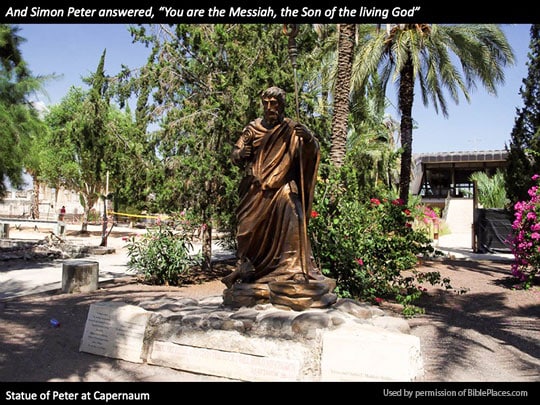
Background
Our study (Matthew 16:13-23; Mark 8:27-33; Luke 9:18-22) begins with Jesus and His disciples moving toward the city of Caesarea Philippi. The gospel of Mark states that they had passed through the various villages in the region as they moved toward the city. That is, even though Jesus was tired, He did not ignore the people in the region.
Jesus went out, along with His disciples, to the villages of Caesarea Philippi . . . Mark 8:27a (NASB)
Most likely they stopped at each village so that Jesus could preach and heal various people, but none of the gospels state that for a fact. The city of Caesarea Philippi was located at the base of Mount Hermon, which would have been snow capped in the winter season since the peaks of the mountain tower to an altitude of 9,230 feet (2,814 m). The city is located about 25 miles (40.23 km) north of Capernaum. The base of the mountain is about 1,150 feet (351 m) above sea level. As we will discover in the next series of studies, Jesus will spend some unusual time training His disciples on the mountain. But in this study we are told that Jesus and the disciples are engaged in a discussion as they move toward the city. We do not know if they arrive at the city while they talking or at the end of their discussion.
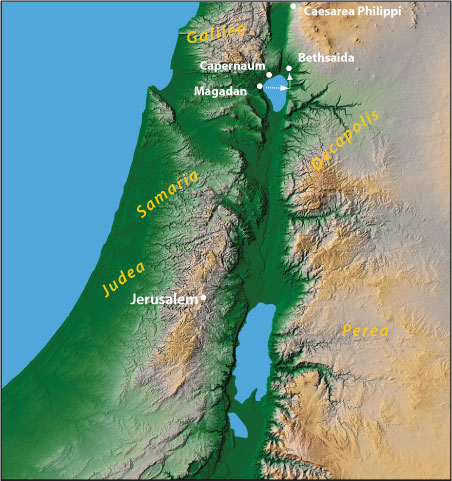
The Question
Luke 9:18 states that while Jesus and the disciples were moving towards Caesarea Philippi, they had stopped and Jesus was praying. Sometime after He finished praying, Jesus asked the disciples a question.
And it happened that while He was praying alone, the disciples were with Him, and He questioned them, saying, “Who do the people say that I am? Luke 9:18 (NASB)
The gospel of Matthew reveals that either Jesus clarified His question with a follow-up question or the following was the initial question. Here is the quote,
Now when Jesus came into the district of Caesarea Philippi, He was asking His disciples, “Who do people say that the Son of Man is?” Matthew 16:13 (NASB)
Then Jesus waited for the response.
A quick comparison of Matthew 16:14 with Mark 8:28 and Luke 9:19 indicates that a group discussion followed with a number of people blurting out what they had heard. Each of the responses vary slightly as each one tried to express what they had heard. The core message was the same. I wonder what Judas said, if anything? Did he keep quiet? Did he have doubts about Jesus? How about the disciple whom Jesus’ loved – John? What about Matthew, Andrew, or doubting Thomas? I wonder if they looked at one another first before answering? Whatever occurred in those few brief seconds, the collective response communicated the following rumblings of the people.
And they said, “Some say John the Baptist; and others, Elijah; but still others Jeremiah, or one of the prophets.” Matthew 16:14 (NASB)
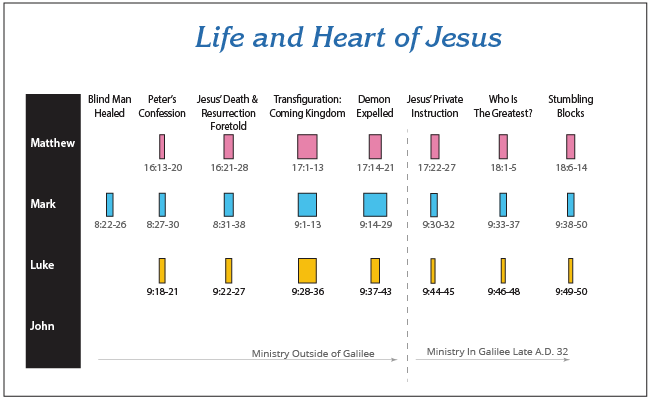
Who Am I?
The Jews of Jesus’ time believed that the souls of departed prophets had a special ability to empower living men and to help them complete their work[1]. The disciples’ response indicates that the people were trying to understand Jesus. Who was He? We will see later in John 7-8 that the people were confused about the identity of Jesus and why He was here. Now Jesus asks a logical question.
He said to them, “But who do you say that I am?” Matthew 16:15 (NASB)
The actual Greek word order is as follows,
You, who do you say I am?
The Greek language places the most important word first in the sentence. In this verse “you” occurs first. The emphasis of Jesus’ question is upon “you.” He wants to know what His disciples thought – not the crowds. What about you? Who do you think I am? Jesus wanted to hear what they believed. In truth, Jesus already knew what they believed. Luke 11:17 reveals that Jesus knew their thoughts.
But He knew their thoughts . . . Luke 11:17 (NASB)
Furthermore, Peter had already stated in John 6:69 that Jesus was the Holy One of God. The disciples had been talking amongst themselves about Jesus. Now each one had to reveal to the others what they were truly thinking about Him. It was also important for them to articulate what they actually believed about Jesus. Peter went first,
Simon Peter answered, “You are the Christ, the Son of the living God.” Matthew 16:16 (NASB)
Notice Peter’s confession, “You are the Christ, the Son of God.” Did we accurately quote Peter? Is that what he said? No! We deleted the word “living.” Peter believed that Jesus was the Son of the living God. Peter knew that our God is One who is alive and not dead. We do not serve a dead God, but a living God. When Peter said that Jesus was the Son of God, he declared that he believed Jesus was God himself. A review of John 10:33 and 36 reveals that the meaning of the phrase “Son of God” referred to deity. Notice, that in John 10:36 Jesus stated that they had accused Him of blasphemy when He said He was the “Son of God.” That is, “son of God” meant “God.” Therefore, Peter declared that Jesus was God. Peter was correct and his statement was powerful.
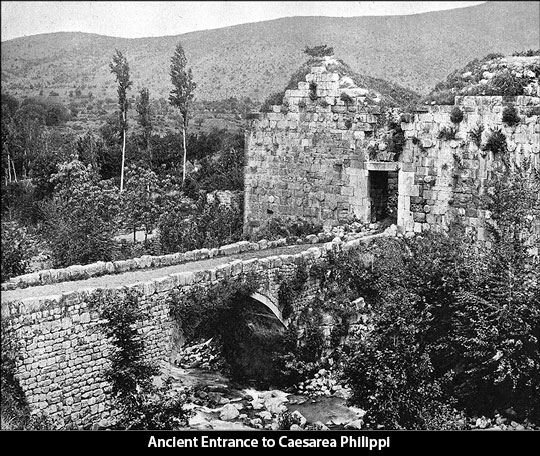
Truth Revealed
Only the gospel of Matthew records Jesus’ reply to Peter. The other gospels are silent. Jesus’ reply is unexpected and yet comforting.
And Jesus said to him, “Blessed are you, Simon Barjona, because flesh and blood did not reveal this to you, but My Father who is in heaven.” Matthew 16:17 (NASB)
Peter did not discover this himself by observation and investigation. No secular Egyptian scroll, Babylonian astronomer, Greek scientific genius, or Jewish theology class revealed this truth to Peter. The Holy Spirit was the one who revealed this truth to Peter. He opened Peter’s mind so that he could understand and the Spirit must open our understanding or we will never ever understand, Jesus (1 Corinthians 2:12-14). Two of the greatest proofs that a person is a Christian is what they say about Jesus. First, is He God and, second, is He their Lord. Notice the message of 1 Corinthians 12:3.
Therefore I make known to you that no one speaking by the Spirit of God says, “Jesus is accursed”; and no one can say, “Jesus is Lord,” except by the Holy Spirit. 1 Corinthians 12:3 (NASB)
Only those who have accepted Jesus as Savior are true Christians. What do you think about Jesus? The proof that one is a true Christian is revealed in their conduct (Matthew 7:21-23; James 2:26). The ultimate mark of true Christians is revealed by what they do when they do not want to obey. Next, Jesus warned them to not reveal this truth to anyone.
But He warned them and instructed them not to tell this to anyone . . . Luke 9:21 (NASB)
Peter Rebukes Jesus
Then Jesus started teaching the disciples about Himself.
And He began to teach them that the Son of Man must suffer many things and be rejected by the elders and the chief priests and the scribes, and be killed, and after three days rise again. Mark 8:31 (NASB)
The words were clear and simple. Jesus had to suffer, die, and return to life three days later. But Peter did not get the message. Even though Peter understood that Jesus was “God” in human flesh, Peter did not understand.
And He was stating the matter plainly. And Peter took Him aside and began to rebuke Him. Mark 8:32 (NASB)
And Matthew 16:22 records Peter’s rebuke.
Peter took Him aside and began to rebuke Him, saying, “God forbid it, Lord! This shall never happen to You.” Matthew 16:22 (NASB)
Peter in his arrogance took Jesus aside and started rebuking Jesus. Peter assumed that he knew everything. But Peter did not understand everything. Like Peter, we sometimes assume that we understand everything too! Even with the help of the Holy Spirit (1 Corinthians 2:12-14; 1 John 2:20), we have difficulty understanding everything in the scriptures today. If someone disagrees with this statement, consider the apostle Peter who stated that there are some difficult things to understand in the Scriptures (2 Peter 3:14-16); and he was an apostle empowered by the Holy Spirit.
Jesus Rebukes Peter. In response, Jesus began rebuking Peter.
But He turned and said to Peter, “Get behind Me, Satan! You are a stumbling block to Me; for you are not setting your mind on God’s interests, but man’s.” Matthew 16:23 (NASB)
Satan had put thoughts into Peter’s mind. Satan does the same thing today. Satan is clever. He wanted to stop Jesus from dying for our sins. Stop! If Satan was bold enough to put thoughts into Peter’s mind to stop Jesus, do you think he would be intimidated by anyone of us? The truth is, Satan is constantly working to motivate us to sin. He tempts and encourages us to do the wrong thing (Matthew 16:23; Mark 1:13; 1 Corinthians 7:5) and then we agree and complete the act by sinning (James 1:.14-16). Satan’s suggestion seemed like a good idea and so Peter attempted to encourage Jesus to avoid the cross. Wow, did Peter get rebuked!
The Holy Spirit tells us in Ephesians 6:11-17 how to wage war against the devil. That passage describes the Armor of God and indicates that one needs to believe in Jesus Christ first. Then that person needs to be confident that he or she has peace with God (Romans 5:1). He or she must also be truthful, righteous, have strong faith in God, be in the Word of God constantly, and have a meaningful prayer life.[2] These are the tools of our warfare with Satan. They help us avoid sin and the temptation to motivate others to sin. Apparently, Peter had not learned about the weapons of this warfare, and quite frankly, I forget about these weapons on occasions. We all need to remember them and fight the good fight against our adversary. We need to be alert because Satan prowls like a lion. He is after us.
Be of sober spirit, be on the alert. Your adversary, the devil, prowls around like a roaring lion, seeking someone to devour. 1 Peter 5:8 (NASB)
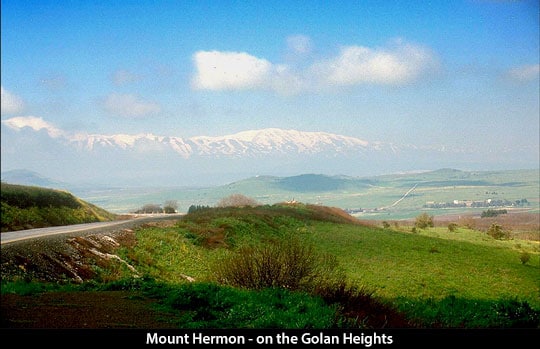
Surprising Revelations
In the middle of this discussion Jesus surprised Peter with the following words,
I also say to you that you are Peter, and upon this rock I will build My church; and the gates of Hades will not overpower it. I will give you the keys of the kingdom of heaven; and whatever you bind on earth shall have been bound in heaven, and whatever you loose on earth shall have been loosed in heaven. Matthew 16:18-19 (NASB)
Matthew 16:18-19 has been a passage of great dispute. In order to understand this passage, one must look beneath the English text to the original Greek. The original language reveals that Peter’s name comes from the Greek word PETROS which means “rock, a piece of rock, or a stone.”[3] It is in the masculine form. The English word translated as “rock” in the verse comes from PETRA. It is in the feminine form and means “bedrock or rock.”[4] The two words have important shades of meaning. Jesus was simply stating that the church would be built upon bedrock – a solid foundation, the testimony that Peter stated in verse 16, and not on Peter. Otherwise, Jesus would have said, “I will build My church upon you, Peter.” But He did not. The reference to ‘bedrock” was a reference to Jesus Himself. Jesus is the foundation stone, the bedrock, or the chief corner stone as Acts 4:11 and other passages remind us.
He is the STONE WHICH WAS REJECTED by you, THE BUILDERS, but WHICH BECAME THE CHIEF CORNER stone. Acts 4:11 (NASB)
It has been suggested that petros and petra have a blurred meaning and that petra eventually came to mean “rock” and petros was no longer used sometime after Christ.[5] Yet, the fact that Jesus used two different words implies He wanted to communicate something different. Peter (petros) was not the petra or bedrock of the church. Jesus was and is. Additionally, consider the fact that Peter was not the only builder of the church. In 1 Corinthians 3:6 we are told that men such as Peter or Apollos might plant and water but it is God who gives the increase. In 1 Corinthians 3:10-11 we are told that God is the wise master builder and Jesus is the foundation. Verse 11 states,
For no man can lay a foundation other than the one which is laid, which is Jesus Christ. 1 Corinthians 3:11 (NASB)
Ephesians 2:19-20 says that Jesus is the corner stone of the church, and the apostles together are the foundation and not just Peter.
The book of Acts gives us the history of the early church. There we discover that God used Peter to start the church. After his first sermon three thousand people were added to the church by God (Acts 2:14-36). In Acts 3:11-26 we are told that five thousand were added after Peter’s second sermon. It is clear that in the early part of Acts Peter receives the main focus. But from Acts 9 to the end of the book, the apostle Paul receives most of the focus.
Consequently, it is best to see Peter as the apostle God used to start the church but not as a pope or its leader. In fact, Acts 15 makes it clear that James was the leader of the church in Jerusalem (1 Cor. 15:7). This is the church that Peter apparently attended (Galatians 2:1-12). John Chrysostom (A.D. 347–407) stated in his Matthew commentary that Peter was the “mouth of the apostles.”[6] Jesus was the rock and Peter was a builder.
Then Jesus added that the “gates of Hades shall not over power it.” John MacArthur comments about this phrase,
The gates of Hades has often been interpreted as representing the evil forces of Satan attacking the church of Jesus Christ. But gates are not instruments of warfare. Their purpose is not to conquer but to protect those behind them from being conquered, or, in the case of a prison to keep them from escaping.[7]
The gates should be understood as a restraining force. The gates of Hades will not be able to restrain God’s redeemed people.
Then Jesus added that He would give the keys of the kingdom of heaven and “whatever you bind on earth shall be bound in heaven and whatever you shall loose on earth shall be loosed in heaven.”William Mounce comments,
This is the language of the law court. Jewish legal issues were normally decided in Jesus’ day by elders in the synagogue community (later by rabbis). Many Jewish people believed that the authority of Heaven stood behind the earthly judges when they decided cases based on a correct understanding of God’s law. (This process came to be called ‘binding and loosing.’) Jesus’ contemporaries often envisioned God’s justice in terms of a heavenly court; by obeying God’s laws, the earthly court simply ratified the decrees of the heavenly court.[8]
Consequently, whenever the elders of a church make a decision consistent with the Word of God, their decisions are supported by heaven. This glorious truth hinges on the fact that Jesus is the Christ, the son of the living God.
Conclusion
Why was this event recorded in the gospels? Was it recorded so that we had a nice story to share with others or for pastors to preach? No, the event was recorded so that we could understand that Jesus was and is God. Not only was Jesus revealing that truth to others (John 5:18; 8:58; 10:33-36), but even the disciples understood that truth. That is the primary message.
The secondary message is that Jesus was serious about dying for us. When rebuked, Jesus made it clear that He did not want to be tempted to avoid the cross. He planned to die for our sins, and nothing was going to stop Him. Not even Satan was not going to stop Him!
The third lesson from this passage is that Peter knew Jesus was God in human flesh, but yet he still sinned. Peter was one who believed in Jesus, but he still sinned. He was still a tool Satan could use. This means we are engaged in a spiritual battle. We are in serious warfare and we are the potential victims. We need to put on the Armor of God and fight the good fight.
Fight the good fight of faith; take hold of the eternal life to which you were called, and you made the good confession in the presence of many witnesses. 1 Timothy 6:12 (NASB)
I have fought the good fight, I have finished the course, I have kept the faith . . . 2 Timothy 4:7 (NASB)
The next study will explore the meaning of Matthew 16:17-18.
References:
1. Mark E. Moore. The Chronological Life of Christ. College Press. 1996. P. 280. ((Josephus. Wars of the Jews. 1.599)
2. The Temptation of Jesus
3. Liddell and Scott. Greek-English Lexicon. Clarendon Press -Oxford Press. 1996., p. 1398.
4. Louw and Nida. Greek-English Lexicon of the New Testament. United Bible Societies. N.Y., 1989. vol. 1 p. 291.
5. John Nolland. The New International Greek Testament Commentary. Eerdmans Publishing. 2005. p. 669.
6. John Chrysostom. The Nicene and Post-Nicene Fathers First Series, Vol. 10, Homily 54 2, Hendrickson Publishers. 1995. p. 701.
7. John MacArthur. Matthew 16-23. The MacArthur New Testament Commentary. Moody Press. 1988. p. 32.
8. William D. Mounce. Basics of Biblical Greek Grammar, Zondervan. 2009. p. 121.